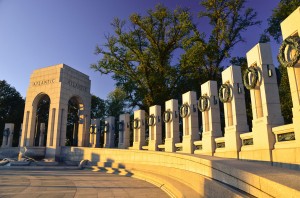On the Hill: Prayer Plaque Bill Passes Congress
 The National World War II Memorial in Washington, DC. Photo by surangaw / 123RF
The National World War II Memorial in Washington, DC. Photo by surangaw / 123RF In May I wrote about a bill that raised some big church-state separation concerns, the World War II Memorial Prayer Act of 2013. This act would place a commemorative plaque inscribed with the prayer President Franklin D. Roosevelt recited on the morning of D-Day, June 6, 1944, at the World War II monument in the nation’s capital.
As I noted at the time, the American Humanist Association strongly opposes the erection of monuments of a religious in nature on public ground, mainly because of our belief that these monuments are a violation of the separation between church and state and alienate nonreligious soldiers and soldiers whose faiths aren’t accounted for in the religious language.
It’s worth noting that the prayer made by FDR is especially religious and divisive in nature, as it claims that “Our sons, pride of our Nation, this day have set upon a mighty endeavor, a struggle to preserve our Republic, our religion….” Atheist and humanist soldiers who served in World War II certainly weren’t doing so in order to preserve “our religion” and any attempt to pin a religious motivation to the actions of these service members is in exceedingly bad taste.
Unfortunately, the U.S. Congress seems to feel differently about the issue, as they have just passed the bill in the House and the Senate. In fact, the Senate passed the bill with unanimous consent, which means that not even one individual in either party raised an objection to the bill. At least in the House the following twelve brave Representatives had the courage to vote against the bill: Suzanne Bonamici (D-OR), Judy Chu (D-CA), Katherine Clark (D-MA), Tammy Duckworth (D-IL), Keith Ellison (D-MN), Mike Honda (D-CA), Hank Johnson (D-GA), Jerrold Nadler (D-NY), Beto O’Rourke (D-TX), Mark Pocan (D-WI), Bobby Scott (D-VA), and Niki Tsongas (D-MA).
The bill now goes to the president for his approval or veto, and many in the nonreligious community, including myself, aren’t expecting him to stand up in opposition to this clearly unconstitutional piece of legislation.
So where does that leave us? It shows our community that while we are making enormous strides against other types of legislation that solely benefit religious communities, especially when it comes to voucher bills for private religious schools, there is still much work to be done to educate members of Congress as to the consequences of passing bills that are either explicitly religious in nature or that weaken the separation between church and state.
